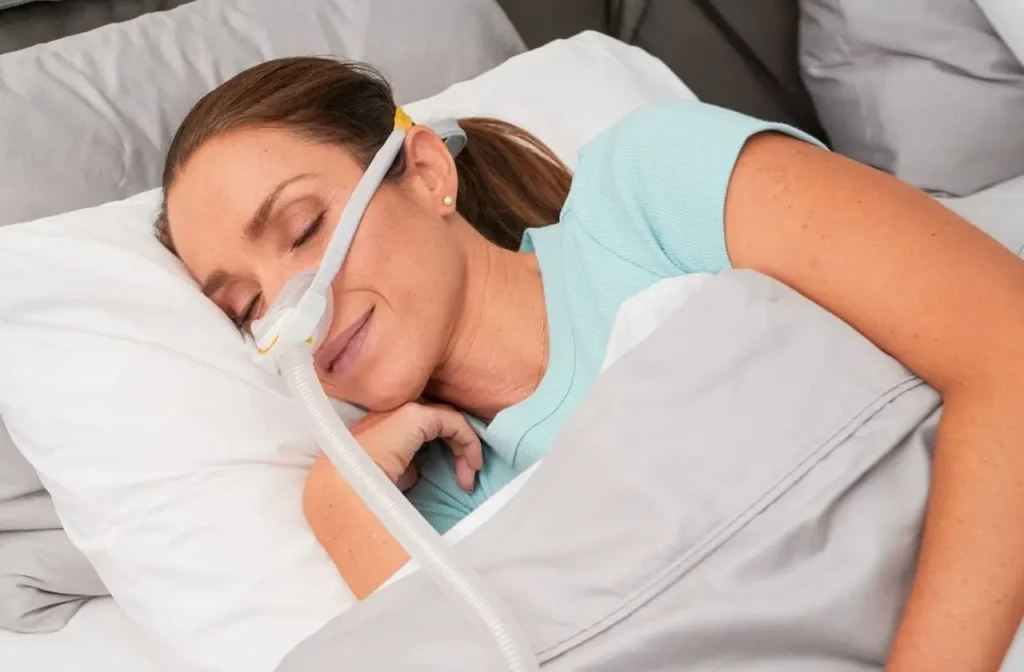Introduction: A Dangerous Nighttime Connection
For most people, nighttime is when the body rests, repairs, and recharges. But for millions of adults, sleep is interrupted by a condition known as sleep apnea — a disorder where breathing repeatedly stops or becomes shallow during the night.
While many think of sleep apnea as just loud snoring or restless nights, its effects go far deeper. One of the most serious connections scientists have uncovered is the link between sleep apnea and high blood pressure (hypertension). Left untreated, this pairing can dramatically raise the risk of heart disease, stroke, and other life-threatening problems.
Understanding how these two conditions interact can be the first step in protecting your long-term health.
Causes of Sleep Apnea: Why It Happens
Sleep apnea isn’t caused by one single factor — it’s usually the result of a combination of lifestyle habits, physical traits, and underlying health conditions.
1. Obstructive Sleep Apnea (OSA)
This is the most common form, caused when the soft tissues of the throat relax too much during sleep, narrowing or completely blocking the airway.
Common risk factors include:
- Excess body weight (fat deposits around the airway can restrict breathing)
- Large tonsils or adenoids
- Narrow airway or small jaw structure
- Sleeping on the back
- Alcohol or sedative use before bed
- Smoking, which irritates and inflames airway tissues
2. Central Sleep Apnea (CSA)
Less common than OSA, CSA occurs when the brain fails to send proper signals to the breathing muscles. This is often linked to heart disease, neurological conditions, or certain medications.
Symptoms of Sleep Apnea: What to Watch For
Sleep apnea can be tricky to detect, especially if you live alone. Many people are unaware they stop breathing at night — they just know they wake up tired.
Se more: Understanding Sleep Study Costs in Canberra: A Patient’s Guide
Common symptoms:
- Loud, chronic snoring (especially with pauses or choking sounds)
- Waking up gasping for air
- Excessive daytime fatigue, even after a full night’s sleep
- Morning headaches
- Dry mouth or sore throat upon waking
- Difficulty concentrating or remembering details
Subtle signs you might overlook:
Some people don’t snore but still have sleep apnea. They may experience mood swings, irritability, or reduced work performance. Others might notice they get up to urinate frequently during the night — something often overlooked as a symptom of disrupted breathing.
Example: James, 48, didn’t think much about his occasional snoring. But when his blood pressure remained high despite medication, his doctor suggested a sleep study. The results revealed moderate OSA, explaining why his blood pressure was stubbornly elevated.
How Sleep Apnea Raises Blood Pressure
To understand the connection, imagine your body trying to breathe through a blocked straw several times a night. Each time your airway closes, oxygen levels in your blood drop.
Your brain reacts by sending out a “fight or flight” signal, flooding your body with stress hormones like adrenaline. This causes your heart to beat faster and your blood vessels to constrict, raising blood pressure.

Over time, these repeated nighttime stress responses can make high blood pressure a permanent condition — even during the day.
Research shows that over 50% of people with sleep apnea also have hypertension, and those with severe untreated OSA are more likely to develop resistant hypertension (blood pressure that stays high despite multiple medications).
The Two-Way Relationship
Interestingly, the link between sleep apnea and high blood pressure works in both directions.
- Sleep apnea can cause high blood pressure.
- High blood pressure, especially when it damages blood vessels, can worsen sleep apnea symptoms by affecting blood flow to breathing control centers in the brain.
This creates a dangerous cycle where each condition feeds the other, increasing the risk of heart attack, stroke, and heart failure.
Treatment Options: Breaking the Cycle
Fortunately, treating sleep apnea can have a positive impact on blood pressure — and vice versa. Here’s an overview of common treatment strategies.
1. CPAP Therapy (Continuous Positive Airway Pressure)
CPAP machines deliver a steady flow of air through a mask, keeping the airway open during sleep. Studies have shown that regular CPAP use can lower blood pressure in people with OSA, especially nighttime readings.
What to expect: It may take a few weeks to get used to wearing the mask, but many patients report improved energy and focus within days.
2. Oral Appliances
For mild to moderate OSA, specially designed dental devices can reposition the lower jaw or tongue to keep the airway open.
Scenario: Linda, 55, switched from CPAP to a custom oral appliance because she found the mask uncomfortable. Her follow-up sleep test showed her breathing improved, and her blood pressure dropped slightly.
3. Weight Management
Excess weight is one of the strongest risk factors for OSA. Even a 10% reduction in body weight can lead to measurable improvements in breathing and blood pressure control.
4. Surgery
Procedures like uvulopalatopharyngoplasty (UPPP) or jaw advancement surgery can help if structural issues are the main cause. Surgery is generally considered when other treatments have failed.
5. Lifestyle Changes
- Sleep position therapy: Sleeping on your side can reduce airway blockage.
- Limit alcohol and sedatives: These relax throat muscles and worsen OSA.
- Quit smoking: Reduces airway inflammation.
- Manage stress: High stress contributes to both hypertension and poor sleep quality.
Why Treating Both Conditions Matters
Leaving either sleep apnea or high blood pressure untreated increases the risk of:
- Heart attack
- Stroke
- Heart failure
- Kidney disease
- Memory problems and dementia
Treating sleep apnea often improves blood pressure control, reducing the need for additional medications. Similarly, managing blood pressure can help ease strain on the cardiovascular system during sleep.
Conclusion: Take the Link Seriously
The relationship between sleep apnea and high blood pressure isn’t just a medical curiosity — it’s a dangerous combination that can silently damage your heart and blood vessels.
If you snore loudly, wake up feeling unrefreshed, or have high blood pressure that’s difficult to control, don’t ignore it. Speak with a healthcare professional about getting a sleep study.
Early detection and treatment can not only help you sleep better but also protect your heart, brain, and overall health. Restoring healthy breathing at night might be the key to finally getting your blood pressure under control — and giving your body the restorative rest it needs.

